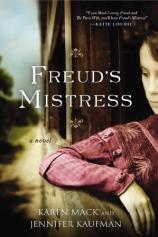Freud's Mistress
Review
Freud's Mistress
“It was exhausting trying to sustain the feeling that she was just one step away from happiness,” thought Minna Bernays in 1895 Vienna. FREUD’S MISTRESS opens with her dismissal, yet another termination, from a position as companion to a baroness. Minna has rashly attempted to save a neglected servant girl in the baroness’s house, but is fired and left with no home, income or security. It has happened before.
Minna is well read and makes her own decisions about philosophy and literature; she is capable of compassion and generosity; and her sense of understanding those around her is genuine. And there’s a cheekiness about her that might set her apart from women in general in a traditional, turn-of-the-century Austria. She is very likable and believable.
"Because of Sigmund Freud’s place in the world of scientific knowledge, his life has been fair game for speculation and inquiry. FREUD’S MISTRESS does just this as it fictionalizes the maybes of the relationship with his sister-in-law."
However, Minna’s exhaustion from trying to be happy will never end. She moves in with her sister, Martha; Martha’s husband, Sigmund Freud; and their six children. She becomes a favorite aunt and caregiver, and a confidante of Freud’s. Martha has given herself to the cares of being a mother, and she and Freud have tacitly agreed to a marriage with civility on the outside, co-existence on the inside.
Minna and Freud’s attraction to one another is documented throughout the early months she lives in his home. She reads and comments on his papers and attends his lecture at the university, reveling in his mastery of his material and students. He likes talking with her and spending late-evening hours explaining the controversial methods of research leading to the field of psychoanalysis. Authors Karen Mack and Jennifer Kaufman show how much resistance Freud encountered in his lifetime against his work and unorthodox beliefs and practice, as well as his religion. One of the points of contention between Freud and his wife is his unwillingness to conform to the necessary making-nice polices of fin-de-siècle Vienna.
For the brilliant Freud, though, his pursuit of his sister-in-law seems almost mundane. Martha doesn’t understand him, he says, and he fantasizes with Minna about what their lives would have been like had he married her. However, he offers Minna very little after the initial thrill of seduction and a pseudo-honeymoon in Switzerland. Their love affair continues after Minna’s attempt to change her life fails and Freud comes to Hamburg to return to her home.
The poignancy of her situation as mistress to her sister’s husband is seen as she stands before him in a hotel room while he is writing a note to his wife asking about the children and lying regarding the purpose of his trip. His lack of guilt at this blatant betrayal is “the devil’s rationale,” and Minna disagrees with it. She listens stiffly to his explanation of why she should not feel guilt for the deception and turns away, but only momentarily. She stays. A few minutes later, as she listens to the sounds in the hallway of laughter and conversation and guests leaving the hotel, she realizes “[e]veryone here was eventually going home. What a simple concept, which somehow always eluded her.” Minna’s choices have assured her that she will never go home.
The ultimate price of the betrayal goes beyond the pages of the book. Minna lives in the Freud household for the next 40 years as a loved aunt and companion, and Mack and Kaufman suggest that her loyalty and love for Freud continued as well.
Because of Sigmund Freud’s place in the world of scientific knowledge, his life has been fair game for speculation and inquiry. FREUD’S MISTRESS does just this as it fictionalizes the maybes of the relationship with his sister-in-law. Ultimately, however, the story is not about two lovers drawn together by passion and intelligence; it is a sad guess about the boundaries of Minna Bernays’s life.
Reviewed by Jane Krebs on July 26, 2013
Freud's Mistress
- Publication Date: June 3, 2014
- Genres: Fiction, Historical Fiction
- Paperback: 384 pages
- Publisher: Berkley Trade
- ISBN-10: 0425270025
- ISBN-13: 9780425270028






